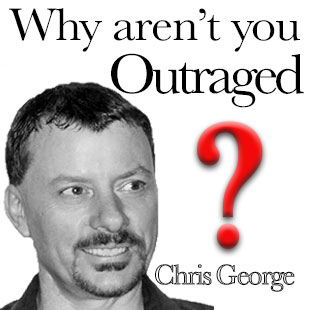
(CHRIS GEORGE / iNFOnews.ca)
September 19, 2017 - 12:15 PM
OPINION
I had the opportunity to listen to a couple of well known analysts of B.C. politics on the radio the other day.
They were chastising the new government for removing an important principle from the former government's position on the carbon tax. They were quick to mention how this tax brought kudos from around the world over the years and especially pumped up the feature they really liked; revenue neutrality.
I also think the principle of revenue neutrality is important, but I don't think the B.C. Liberal version of the carbon tax was any better than what the NDP has given us by eliminating it.
We live in a capitalist society. We have agreed that markets are more efficient than committees when it comes to determining what needs to be produced. Yet we still have blind spots when it comes to the government and its involvement in the marketplace. Regressive sales taxes have been used in the past to raise revenue, but they have also been used to pick winners and losers in the markets.
The carbon tax is a prime example; the goal is to reduce emissions, so we tax what we don't like (pollution) and don't tax things we do like (income).
So far this describes the B.C. Liberal revenue neutral model. Like many of the tax initiatives that came from their brain trust over the years, this is a regressive tax. It impacts people across the board based on their consumption of carbon intensive fuels. The construction worker filling up the family Jetta pays the same as the CEO topping off the Benz. As with all regressive taxes, it hits the poor harder than the rich, the rural more than the urban. This is why I can't support the old version of revenue neutrality.
The N.D.P. vision is to redirect this revenue towards transit projects. The tax will continue to penalize carbon intensive fuel purchases, but instead of using offsetting cuts to income taxes to maintain revenue neutrality, the ever increasing carbon fees will be used to fund alternative transportation, primarily in the Lower Mainland.
On the surface, this is a very seductive idea. We use the funds generated by fuel consumption to fund the alternative. Once again we rely on the market to pull people out of their cars and onto the bus, but in the process we are really just subsidizing a non-marketable alternative. The subsidy, both in capital to build out the infrastructure and in ongoing expenses will never end. People will also have less money in their pockets as the carbon fee is no longer revenue neutral.
There is a version of the carbon tax that promises to be as effective as what we have. It would discourage carbon intensive purchases, would capture all carbon (instead of just transportation fuels), and would be revenue neutral in a non-regressive way. Former N.A.S.A. scientist, James Hansen, proposed it over a decade ago and no jurisdiction has taken it up yet.
The idea is a carbon fee taken at source (well head, mine, feedlot) and a personal dividend to every individual. The dividend would be based on the total fees collected divided by the number of people. So we would all get a monthly cheque based on the average carbon fee collected in the province. Those who purchase more carbon than average would pay more out than they receive back as a dividend. Those who purchase less carbon than the average would receive an incentive to continue doing so.
The average person would be no better or worse off. It leaves us all free to choose how we want to spend that money.
Where does that leave transit funding? We need to ask ourselves if there is any benefit in using tax dollars to decide who is going to win in the transportation marketplace. If there is, do we have the resources to support two different systems?
Can anyone else see the problem with supporting two market opponents with tax dollars? I think we can only support one and it is probably time to cut off the "happy motoring society" before it bankrupts us.
So why not re-purpose the money we would normally spend on building more capacity in our road network to building out transit? We know that building capacity simply leads to more traffic; it has become a zero sum game, where no matter how much we spend we can never achieve the goal of less traffic. It is counterintuitive, but it is simply the marketplace at work.
As trips become cheaper in both time and money, people make more trips. This holds true for both transit and the road network. The version of the carbon tax we had (even with all the top-ups and tax jiggery-pokery), and the version we are getting (still with top-ups and tax shenanigans), are both horrible for people who live in rural areas. The first was regressive, the second simply disconnects those who pay and those who receive.
As with the removal of the bridge tolls, many in the Interior are going to be justifiably choked. They should have been choked with the old tax too, but I guess there has always been a bit of Stockholm Syndrome at play between voters in the Interior and the B.C. Liberals.
The carbon fee and dividend system would at least be an improvement over the old tax, instead of a step backwards. It would spur innovation and allow people to make their own decisions with their money, which isn't something most taxes can claim.
We have a chance to show the world a true innovation in emissions reduction. Let's take it while we have the chance.
— Chris George believes one measure of a just society is found in how well it balances fiscally conservative economics with social responsibility and environmental soundness in all of its living arrangements.
News from © iNFOnews, 2017